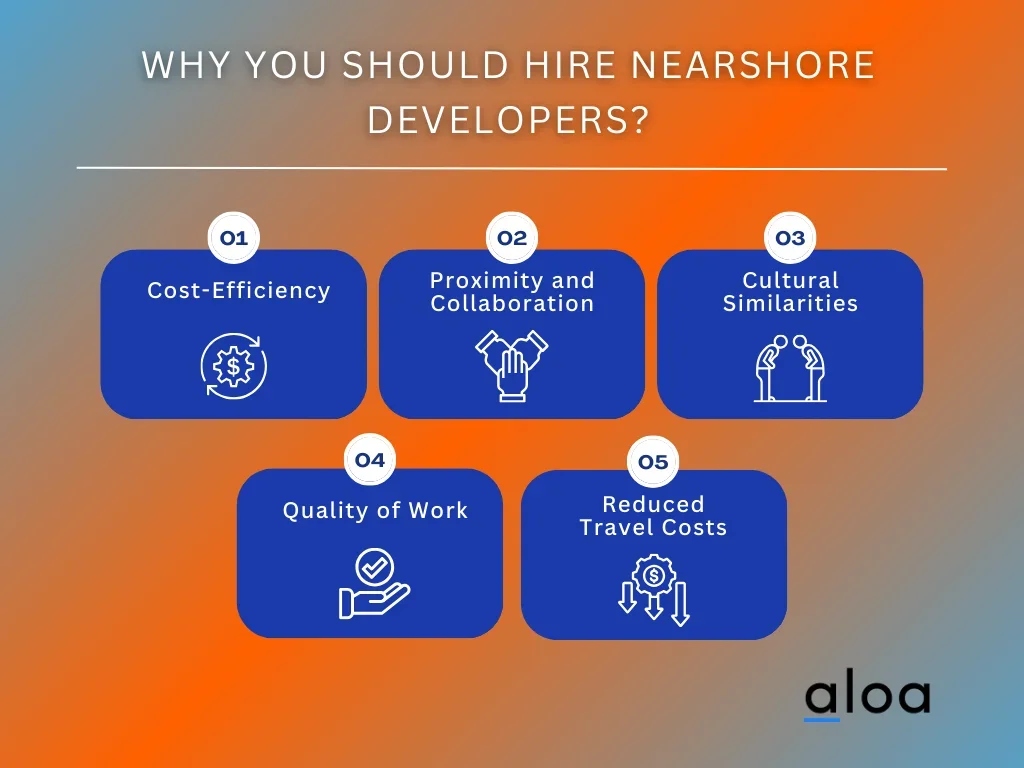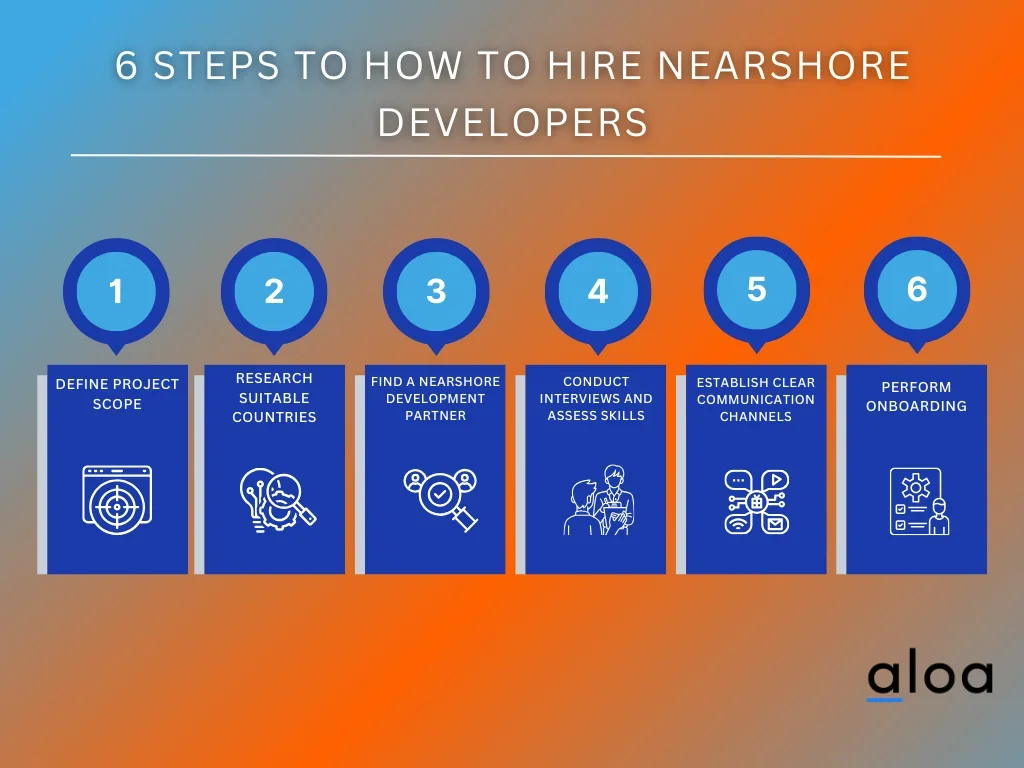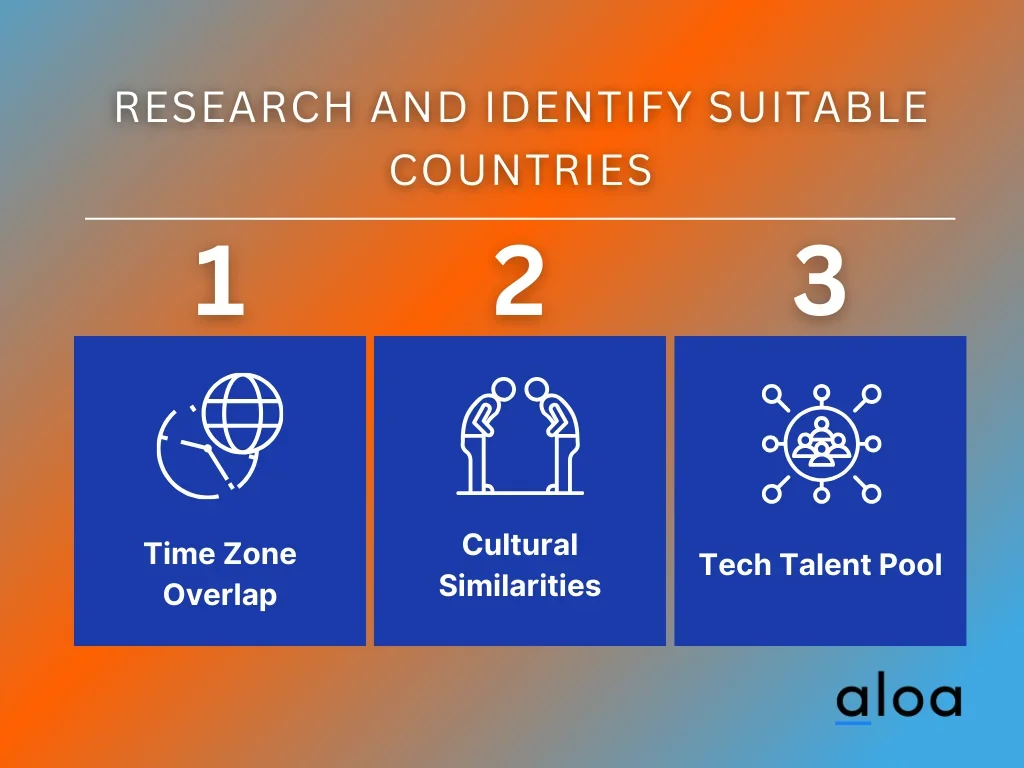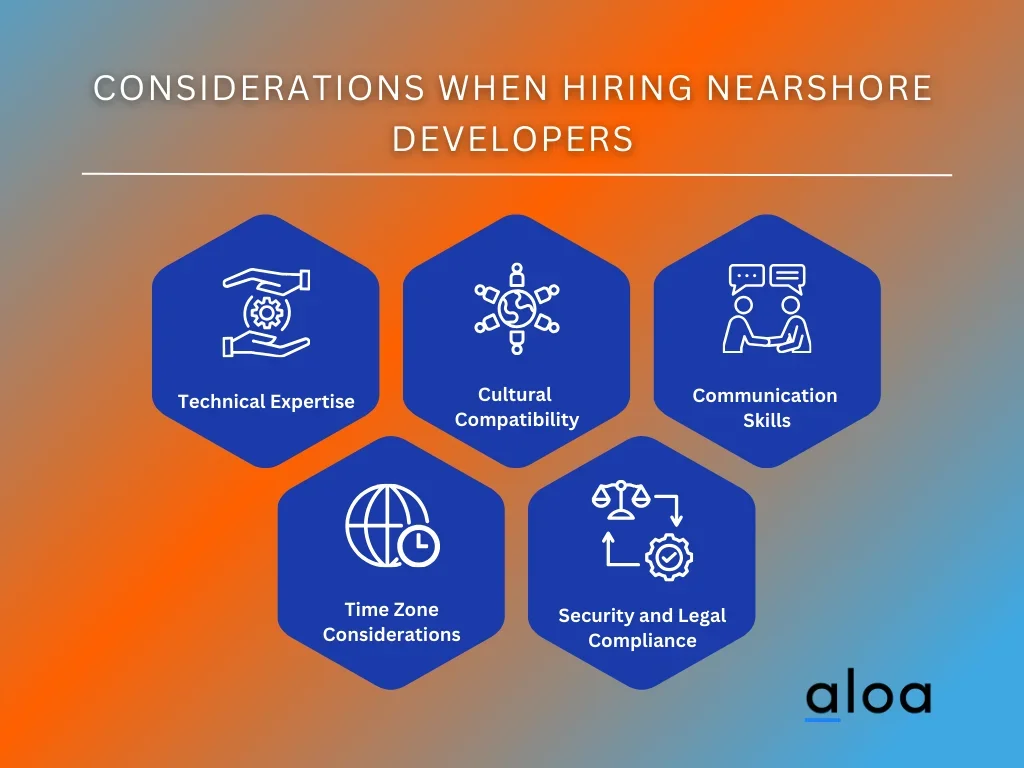Strategic Guide To Hiring Skilled Nearshore Developers 2024
The growth demand for nearshore developers has become a pivotal factor for businesses and startups. However, this pursuit has challenges, such as navigating time zone differences, language barriers, and the need for cultural alignment. Businesses and startups must strategically address these hurdles to thrive in this competitive arena.
Aloa, an expert in software outsourcing, understands the unique needs of businesses and startups regarding nearshore software development. Our team helps you navigate these challenges efficiently, ensuring you have access to top developers in a similar time zone, exhibit strong work ethics, and deliver quality software solutions.
In this blog, we will delve into a comprehensive guide on how to hire skilled nearshore developers. We'll explore the strategies to find the best talent, create compelling job descriptions, and highlight the key considerations when hiring nearshore development teams. By the end of this blog, you will have a clear roadmap to make the right choice when it comes to nearshore software
Let's dive in!
Why You Should Hire Nearshore Developers
Hiring nearshore developers is a strategic move for businesses seeking efficient, cost-effective solutions. When you need highly skilled software experts, considering nearshore development can be the key to success. Let's explore five compelling reasons why you should hire nearshore developers:

Cost-Efficiency
Nearshore developers offer a cost-effective solution, making them a top choice for businesses of all sizes. Operating in regions like Latin America and Eastern Europe, where the cost of living is lower, they can provide high-quality software development services at a fraction of the price. By reducing labor expenses, businesses can allocate resources to other aspects of their projects, such as product design and quality assurance.
Proximity and Collaboration
One of the critical advantages of nearshore development is the proximity of the development team. With nearshore developers in Latin America and Eastern Europe, businesses in the United States and Western Europe can collaborate in real time.
This ensures that project managers, software engineers, and UI design experts can communicate effectively and work closely together. The reduced time zone differences eliminate many of the challenges in offshore development processes.
Cultural Similarities
Cultural similarities are another reason why you should consider hiring nearshore developers. Developers in nearshore software development companies often share common cultural traits and values. The shared understanding and cultural alignment can lead to improved teamwork and seamless integration of the development team with your in-house staff, creating a harmonious environment for web development, mobile app development, and software development projects.
Quality of Work
Quality assurance is a top priority for nearshore software developers. They take pride in delivering high-quality software development services backed by years of experience and a focus on software development best practices.
Their commitment to excellence ensures you receive top-notch products and services, whether in custom software or product development services. With nearshore developers, you can expect software engineers dedicated to meeting and exceeding your expectations.
Reduced Travel Costs
Unlike offshore development, which may require frequent international business travel, nearshore development minimizes travel costs. With nearby nearshore development teams, personal visits become more practical and affordable.
This ease of access allows for in-person collaboration and effective project management without incurring significant travel expenses. The proximity of your development team means that you can keep travel costs to a minimum while reaping the benefits of an international team.
6 Steps to How To Hire Nearshore Developers
If you're looking to build a new software project, enhance an existing one, or scale your development team, nearshore developers can offer numerous advantages. In this guide, we will take you through a comprehensive six-step process on how to hire nearshore developers effectively, ensuring that you find the right talent for your needs.

Step 1: Determine Your Requirements and Project Scope
Clarity is the foundation of any successful hiring process, and this holds particularly true for nearshore developers. The spectrum of software development is vast, encompassing everything from web development and mobile application development to artificial intelligence and everything in between.
Before you even start the process of scouting for talent:
- Define your project: Is it a mobile application for iOS, a complex e-commerce website, or a machine learning model to optimize your operations? The nature of the project directly impacts the skill sets you require.
- Decide on the tech stack: The technologies you opt for are crucial. If your project is based on .NET, hiring a Ruby on Rails specialist won't help much. Know the languages, frameworks, and tools indispensable for your project.
- Project duration and size: Is this a short-term project or a long-term engagement? Are you looking to hire one developer or an entire team? These factors influence both your search and your budget.
By meticulously defining your project requirements and skill set, you will be better prepared to find who perfectly fits your project.
Step 2: Research and Identify Suitable Countries
The next step in your journey to hiring nearshore developers involves researching and identifying suitable countries. Not all nearshore locations offer the same benefits, and choosing the correct country can significantly impact the success of your project. Here's what you need to consider:

- Time Zone Overlap: Evaluate the time zone overlap between your location and potential nearshore countries. A significant time zone difference can lead to communication challenges and project delays. Look for countries with time zones that align well with your working hours.
- Cultural Similarities: Cultural compatibility is an often overlooked aspect of nearshore development. Consider countries with cultural similarities to your own, as this can lead to smoother collaboration and better understanding between your team and the developers.
- Tech Talent Pool: Research the availability of tech talent in your shortlisted nearshore countries. Some countries may have a thriving community of developers specializing in the technology stack you need. This can be a valuable asset for your project.
Considering these factors, you can narrow your options to countries that best align with your project's requirements and your organization's preferences.
Step 3: Find a Nearshore Development Partner
Consider partnering with a reputable nearshore development agency. These agencies have pre-vetted professionals and can quickly match you with developers who align with your needs. This approach saves time and reduces the risks associated with hiring decisions. Research the reputation and track record of the agency you are considering. Read client testimonials, case studies, and reviews to gauge their performance and reliability.
One dedicated nearshore development partner is Aloa, known for its comprehensive project management and rigorous vetting process. Partnering with a trusted agency like Aloa can streamline hiring and enhance your project's success.
Step 4: Conduct Interviews and Assess Skills
While nearshore development agencies can provide top-tier candidates, the final hiring decision rests with you. Conducting interviews is crucial in assessing potential applicants' skills and compatibility with your project.
Here are six categories for asking interview questions, covering both technical and soft skills:
- Technical Proficiency: Ask candidates to explain their experience with specific programming languages or frameworks relevant to your project.
- Problem-Solving: Pose a scenario where they had to overcome a challenging technical issue and inquire about their problem-solving approach.
- Team Collaboration: Assess their ability to work effectively within a team by discussing past collaborative projects and experiences.
- Adaptability: Inquire about their willingness to learn and adapt to new technologies or methodologies.
- Communication Skills: Evaluate their communication skills by discussing how they handle feedback, report progress, and communicate with remote teams.
- Cultural Alignment: Ask about their experience working in multicultural teams and their approach to building rapport with colleagues from different backgrounds.
Additionally, consider referring to a resource like Aloa's Vetting Playbook, which provides structured guidance on assessing technical competencies and soft skills.
Step 5: Establish Clear Communication Channels
Effective communication is the key to successful collaboration. Once you've chosen your team, it's crucial to establish clear communication channels and protocols. Select appropriate communication and collaboration tools. Establish regular check-in meetings to review progress, address any issues, and keep everyone on the same page.
Create a schedule that accommodates both parties' working hours, and be mindful of time zone changes due to daylight saving time. Encourage open communication and be patient with language challenges. Promote cultural understanding and inclusivity within your virtual team. By implementing these communication practices, you can ensure that your collaboration is productive and conducive to project success.
Step 6: Perform Onboarding
The final step in the hiring process involves onboarding your newly hired developers. A well-structured onboarding process sets the foundation for a successful working relationship. Consider the following:
- Draft a comprehensive contract that outlines the scope of work, payment terms, intellectual property rights, and other essential clauses. If you are unfamiliar with international contract norms, seeking legal advice is advisable to ensure all bases are covered.
- Introduce to your in-house team, if applicable. Building personal connections and a sense of camaraderie can enhance teamwork and collaboration.
- Provide access to the tools, resources, and documentation required for the project. Ensuring the developers have everything they need from day one will contribute to a smooth start.
Ad Template When Hiring Nearshore Developers
A well-structured job listing attracts potential candidates and helps streamline the hiring process. Here are essential elements to include in your nearshore developer job ad:
- Job Description: Begin with a clear role overview, briefly highlighting project details and company culture.
- Responsibilities: List the primary tasks using action verbs to show impact.
- Qualifications and Requirements: Specify required skills, experience, and education.
- How To Apply: Provide a straightforward application process with preferred contact methods and any special requirements.
Crafting a nearshore developer job ad with these components will help you connect with the right talent swiftly and effectively.
Sample Ad Template for Nearshore Developer
Job Description
Are you ready to take your software development projects to the next level? We're seeking talented Nearshore Developers to join our dynamic team and help us deliver cutting-edge solutions to our clients. If you're passionate about coding and ready to collaborate with a diverse, skilled team, this is the opportunity you've been waiting for.
As a Nearshore Developer at our company, you'll be responsible for developing high-quality software solutions that meet the needs of our clients. You'll work closely with our clients and internal teams to understand project requirements, design, develop, and maintain software applications, and ensure they are delivered on time and within budget.
Responsibilities
- Collaborate with clients and cross-functional teams to gather project requirements and create technical specifications.
- Design, develop, and test software solutions using the latest technologies and programming languages.
- Maintain and update existing software applications, troubleshooting and resolving issues as they arise.
- Participate in code reviews to ensure code quality and best practices are upheld.
- Stay up-to-date with industry trends and best practices to continuously improve your skills and the team's performance.
- Communicate progress, challenges, and solutions to project stakeholders.
- Provide technical support to clients as needed.
Qualifications and Requirements
- Bachelor's degree in Computer Science or a related field.
- Proven experience as a software developer, preferably in a nearshore or offshore setting.
- Proficiency in programming languages such as Java, C++, Python, or JavaScript.
- Strong problem-solving skills and attention to detail.
- Excellent communication and teamwork abilities.
- Experience with Agile development methodologies is a plus.
- Fluent in English (both written and spoken).
How To Apply
If you're ready to make an impact and be part of a fast-paced, innovative team, we'd love to hear from you. To apply for the Nearshore Developer position, please send your resume and a cover letter highlighting your relevant experience to [email address]. In your cover letter, tell us why you're the perfect fit for our team and how your skills can contribute to our success.
Join us in our mission to create outstanding software solutions and bring your passion for coding to the forefront. Your journey to a rewarding career starts here. Apply now and be a part of our exciting future!
Considerations When Hiring Nearshore Developers
Consider these factors carefully when hiring nearshore developers to create a successful and productive working relationship that contributes positively to your software development project.

Technical Expertise
Ensure that the nearshore developers you hire possess the technical skills and experience required for your software development project. Evaluate their proficiency in relevant programming languages, frameworks, and tools to guarantee they can effectively contribute to your project's success.
Cultural Compatibility
Cultural alignment can significantly impact collaboration and communication. Seek who understands and appreciates your company's culture, values, and work ethics. This compatibility fosters a more harmonious working relationship and improves project outcomes.
Communication Skills
Effective communication is essential for remote collaboration. Assess their language proficiency and communication abilities. Clear and timely communication can prevent misunderstandings and keep the project on track.
Time Zone Considerations
Time zone differences can either work for or against your project. Select a nearshore location with a time zone that aligns well with your team's working hours. This ensures efficient real-time communication and minimizes delays in project progress.
Security and Legal Compliance
Ensure the developers adhere to data security regulations and legal compliance standards. Protect your intellectual property and sensitive information by including robust security measures in your contract and collaboration agreements. Consulting legal experts with expertise in international contracts can provide added protection.
Key Takeaway
Hiring skilled nearshore developers is crucial for startups and businesses looking to maximize their potential. Leveraging the expertise of these professionals can be a game-changer. They bring cost-efficiency, time zone proximity, and cultural compatibility, making them an ideal choice for companies seeking efficient software development solutions.
By understanding the benefits and following the steps outlined in this guide, you can make informed decisions in your hiring process. Whether you need tailored software solutions, collaboration with cross-functional teams, or ensuring the success of your projects, nearshore developers can meet your needs.
Take advantage of the opportunity to enhance your team with nearshore talent. Contact us at [email protected] if you have any questions or need further assistance. Hiring nearshore developers is a strategic move that can drive your business toward success.

